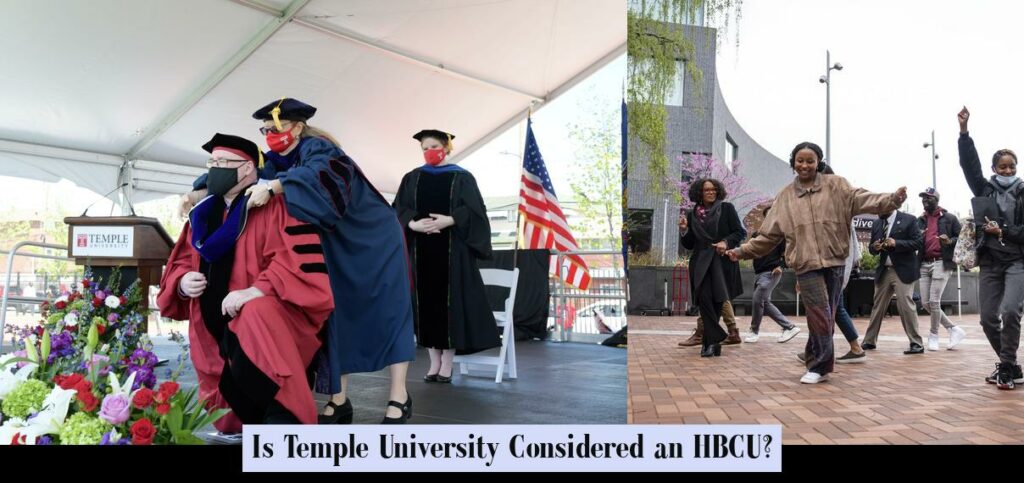Is Temple University an HBCU?
Ah, the ever-exciting debate: Is Temple University an HBCU? Well, the answer is a bit like trying to fit a square peg into a round hole—Temple is more like a stylish octagon in the diverse landscape of colleges and universities. Temple University, with its charismatic student body hailing from various races and ethnicities, dances to the beat of its own drum as a large public research institution.
Now, let’s break it down for you. While Temple may not sport the official HBCU label that some might expect, it does have a sprinkling of black student voices echoing through its halls. So, in essence, while Temple isn’t technically an HBCU, it still waltzes to its unique tune when it comes to diversity and representation.
Did you know that Pennsylvania does house two HBCUs—Cheyney University and Lincoln University? These gems offer a different flavor compared to Temple’s diverse blend. But fear not! Temple still manages to stir up its own brand of magic in the academic cauldron.
Now, imagine this: You’ve got your heart set on attending an HBCU but land at Temple instead. Don’t fret! Embrace the opportunity to experience a different vibe—one that’s both familiar yet refreshingly unique in its fusion of cultures and ideas.
So remember, while Temple University may not be your traditional HBCU sip of tea, it sure knows how to brew a captivating blend that keeps students coming back for more. Stay tuned for more insightful tidbits in the upcoming sections—it’s all part of the enlightening journey through the vast realm of higher education!
| Location | Philadelphia, Pennsylvania |
|---|---|
| Alumni | More than 360,000 worldwide |
| Type | Public university |
| Diversity | Wide range of races and ethnicities |
| Ranking | #89 out of 439 National Universities |
Temple University’s Demographics and Diversity Profile
In terms of diversity and demographics, Temple University shines like a radiant star in the vast galaxy of colleges. The Class of 2027 at Temple boasts a remarkable 57% of students identifying as individuals of color, marking the university’s most diverse cohort yet. This diverse tapestry includes a significant percentage of Pell Grant recipients and first-generation students, further enhancing the inclusive and vibrant atmosphere on campus.
President Richard Englert proudly emphasizes that diversity is not just a label but a core value embraced by the Temple community. The university’s commitment to nurturing an inclusive environment aligns with its mission to provide accessible pathways to education and professional growth.
President Jason Wingard underscores how Temple’s demographic landscape mirrors the evolving real world, where diversity is increasingly vital for success in various fields. As industries adapt to thrive in diverse markets, Temple prepares students by cultivating a richly diverse student body that reflects global shifts.
Temple’s focus on diversity not only enriches academic experiences but also equips students for success in an ever-changing global landscape. By embracing diversity, Temple University paves the way for a brighter and more inclusive future for all its students.
Comparison between Temple University and HBCUs in Pennsylvania
In comparing Temple University and the Historical Black Colleges and Universities (HBCUs) in Pennsylvania like Cheyney University and Lincoln University, an interesting dynamic unfolds. While Temple isn’t officially an HBCU, it stands out as a diverse public research institution with a vibrant mix of students from various backgrounds. On the other hand, HBCUs like Cheyney and Lincoln have a rich history deeply rooted in catering to black students’ educational needs. So, what’s the tea on these contrasting campuses? Let’s sip on some enlightening details to see how they each bring their unique flavors to the table.
When we look at the demographic makeup, Temple University gleams like a gem in the diversity tapestry. With 57% of its Class of 2027 identifying as students of color, Temple embraces inclusivity as one of its core values. This diversity shines through not only in racial representation but also in welcoming Pell Grant recipients and first-generation students with open arms. In contrast, HBCUs traditionally serve predominantly black student populations, offering a different sense of community and cultural experience.
At Temple University, you’ll find yourself immersed in a melting pot of cultures and ideas that create an atmosphere brimming with opportunities for cross-cultural interactions and learning experiences. On the flip side, stepping into Cheyney or Lincoln University might offer you a glimpse into a more historically rooted black educational environment where traditions run deep, fostering tight-knit communities within their campuses.
So, if you’re torn between attending Temple or one of Pennsylvania’s HBCUs, consider what matters most to you—whether it’s experiencing a diverse urban hub bursting with eclectic energy or delving into the rich heritage and community spirit found at an HBCU. Remember that both paths offer unique opportunities for growth and learning; it all boils down to what flavor best suits your academic palate!
- Temple University is not technically classified as an HBCU (Historically Black College or University).
- While not an HBCU, Temple University prides itself on its diverse student body representing various races and ethnicities.
- Pennsylvania is home to two official HBCUs: Cheyney University and Lincoln University.
- Temple University offers a unique blend of cultures and ideas, providing a refreshing and diverse academic experience.
Is Temple University considered an HBCU?
No, Temple University is not considered an HBCU (Historically Black College or University).
What type of college is Temple University?
Temple University is Philadelphia’s public university with a diverse student body and more than 360,000 alumni worldwide.
Is Temple University a PWI?
Yes, Temple University is commonly referred to as a predominantly white institution or a PWI.
Are there any HBCUs in Pennsylvania?
Yes, there are two HBCU institutions located in the state of Pennsylvania: Cheyney University and Lincoln University.

